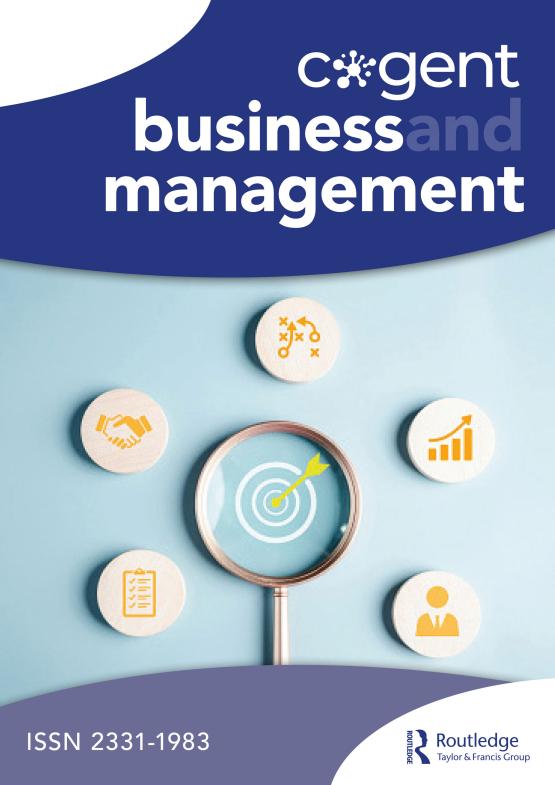Submit a Manuscript to the Journal
Cogent Business & Management
For an Article Collection on
Work in the Modern Workplace: Insights for Managers and HR Leaders
Manuscript deadline


Article collection guest advisor(s)
Associate Professor Kevin Sevag Kertechian,
ESSCA School of Management
Kevin.kertechian@essca.fr
Associate Teaching Professor Hadi El-Farr,
Rutgers, The State University of New Jersey
he89@smlr.rutgers.edu
Work in the Modern Workplace: Insights for Managers and HR Leaders
As McRae et al. (2025) recently highlighted, work is undergoing a profound transformation driven by technological advancements, shifting employee expectations, and evolving organizational structures. According to Kraus et al. (2023), traditional workplace models are being replaced by more flexible, digital, and hybrid environments, redefining how work is performed, managed, and experienced. These changes present opportunities and challenges for organizations, requiring a reassessment of managerial and human resource management (HRM) practices, as noted by Griep et al. (2024). Managers and HR professionals must navigate new paradigms of leadership, employee engagement, and performance management while fostering adaptive and resilient work environments. Additionally, workplace trends, such as remote work, gig employment, and AI-driven decision-making, demand a reconfiguration of roles and responsibilities, and notably for HR professionals, as Pereira et al. (2021) argued. As organizations seek to maintain productivity, innovation, and employee well-being, understanding the implications of these shifts is critical. While these transformations create new possibilities for autonomy and flexibility, they also raise concerns about work-life balance, job security, and mental health, making employee well-being a central consideration in the future of work, as Hill et al. (2022) emphasized. This Article Collection explores the redefinition of work in modern workplaces and examines the new roles and responsibilities that managers and HRM professionals must embrace to thrive in this evolving landscape.
Understanding the transformation of work in modern workplaces is crucial for organizations to remain competitive, sustainable, and responsive to change. As flexible, digital, and hybrid work environments reshape employee expectations around autonomy, well-being, and career development, organizations must adapt or risk disengagement, high turnover, and diminished performance. Managers and HR professionals are no longer just policy enforcers but strategic enablers of innovation, inclusion, and employee well-being. Their ability to foster adaptability, design meaningful work experiences, and effectively integrate digital tools is more critical than ever. Furthermore, the rise of AI, automation, and gig employment demands new approaches to talent management, ethical decision-making, and skills development. By examining these shifts, this Article Collection provides key insights into how organizations can redefine managerial and HRM strategies to cultivate a more resilient, engaged, and future-ready workforce.
This Article Collection explores the transformation of work in modern workplaces through the lens of managerial and HRM evolution. We invite contributions that examine how organizations, leaders, and HR professionals are responding to shifts in work structures, employee expectations, and technological advancements.
Key areas of interest include:
- Transformations in Work Structures: Remote and hybrid work’s impact on leadership, the gig economy’s rise, flexible work arrangements, and organizational culture in decentralized environments.
- The Evolving Role of Managers and HRM: Strategies for engagement, resilience, and retention; managers as enablers of innovation; leadership in digital workplaces; intergenerational workforce challenges.
- Employee Well-Being and Work-Life Balance: Mental health and flexibility, job insecurity vs. motivation, boundaryless work environments, and psychological safety in high-performing teams.
- The Influence of Technology and AI: AI-driven decision-making, automation’s effect on work redesign and engagement, and data-driven HRM practices.
- Diversity in the Modern Workplace: Rethinking DEI in virtual and hybrid settings, bias in AI-driven management, and digital work inequalities.
- Skills, Learning, and Career Development: Evolving competencies, career paths in non-traditional work structures, and lifelong learning.
- Ethical and Strategic Challenges: Algorithmic management, workplace surveillance, and digital exhaustion.
Submissions may include empirical studies, conceptual papers, theoretical contributions, and case studies. This collection aims to advance our understanding of how managers and HRM professionals can proactively shape the future of work while ensuring adaptability, innovation, and employee well-being.
Neither Guest Advisor has any conflicts of interest to disclose.
If you have any questions about this Collection, please contact the commissioning editor, Dr. Molly Cole, at molly.cole@taylorandfrancis.com
Benefits of publishing open access within Taylor & Francis
Global marketing and publicity, ensuring your research reaches the people you want it to.
Article Collections bring together the latest research on hot topics from influential researchers across the globe.
Rigorous peer review for every open access article.
Rapid online publication allowing you to share your work quickly.
Submission Instructions
All manuscripts submitted to this Article Collection will undergo desk assessment and peer-review as part of our standard editorial process. Guest Advisors for this collection will not be involved in peer-reviewing manuscripts unless they are an existing member of the Editorial Board. Please review the journal Aims and Scope and author submission instructions prior to submitting a manuscript.
